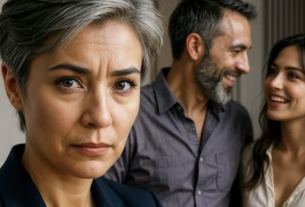“Ir, how much longer?”
Kirill’s deliberately calm voice, though tinged with barely concealed nervous trembling, cut through the cozy evening silence. Irina, sitting in a deep armchair under the floor lamp, didn’t immediately lift her eyes from the stack of bills and advertising brochures she had just taken out of the mailbox and was sorting on the coffee table. All this paper junk was an inseparable part of owning property in Moscow. Her property.
“What do you mean, ‘how much longer,’ Kirill? Speak clearly, I don’t like riddles,” she said without looking up, her fingers still gliding over the glossy leaflets.
He shifted on the sofa, where he always looked somewhat out of place—too large for the old but sturdy furniture. For a month, he had been beating around the bush, choosing his words carefully, feeling out the ground, and now, apparently, he had reached a breaking point. He took a deep breath, gathering all his determination.
“I mean the apartment. This apartment. I feel like a guest here, you know? We’ve been married almost a year, but I have bird’s rights here. Our friends openly laugh and call me a freeloader. They ask when we’re going to build our own nest. Irina, let’s put the apartment in both our names? So we’ll have a real family, a shared future. So I feel like the owner, not a tenant.”
Irina froze. Her hand holding the next utility bill hung in the air. The paper slipped from her weakening fingers and slowly drifted down onto the carpet. She slowly, very slowly raised her eyes to her husband. There was no surprise or indignation in her gaze. There was something else—heavy, assessing, as if she was seeing the man sitting opposite her for the first time. She looked at his face, the tensely pressed lips, the darting eyes, and tried to reconcile this image with the man she had married.
“What did you say?” Her voice was quiet and steady, without a single emotion. She wanted him to repeat it. For this absurdity to be heard again, confirming she hadn’t misheard.
Kirill, interpreting her calmness as a sign to press on, puffed up and leaned forward slightly. His voice took on demanding, almost petulant tones.
“I said, let’s make it joint! So that we have a normal, full family! So I don’t feel humiliated every time I open the door with my own key! I want to invest too, to do repairs, but how can I do that in someone else’s house?”
At that moment, Irina laughed. It was not a joyful or hysterical laugh. It was a cold, cruel, ear-cutting laugh of absolute contempt. It burst from her chest in a short, barking sound that made Kirill flinch and recoil. She leaned back into the chair, her face turning into a harsh, unpleasant mask.
“A normal family?” she repeated, savoring each word. The air in the room, which just a minute ago smelled of freshly brewed tea and dust from old books, suddenly became dense and prickly like glass wool. “A normal family, Kirill, is when a husband tries to squeeze out his wife’s only property? Her fortress? The apartment where she grew up, which she inherited from her grandmother? That’s what you call ‘building a nest’? I think it’s called something else. It’s called coming to everything ready-made and trying to stick your hands in someone else’s pocket.”
She stood up. Short and slender, she suddenly seemed huge and indomitable against the backdrop of her bewildered husband.
“So you want to feel like a man? A real man doesn’t ask to be gifted a house. He builds it. Or at least earns it. And you want me to give you half my life, half the memory of my family, just to stroke your ego and shut up your friends? Are you out of your mind?”
Irina’s words hung in the air, thick and heavy like the sultry heat before a storm. Kirill looked at her, and the color slowly drained from his face, leaving behind a pale, confused mask. He opened his mouth as if to say something, to argue or justify himself, but the words got stuck in his throat. He resembled a fish thrown onto the shore, gasping for air but finding no saving moisture. What could he say? That he didn’t mean it? That he was misunderstood? Any excuse now would sound pathetic and unconvincing.
Irina was the first to break the paralysis. With her usual cold calmness, she walked around him as if he were a piece of furniture undeserving of attention and headed to the kitchen. A minute later, the sound of running water came from there, followed by the click of a stove burner being lit. Ordinary, everyday sounds that seemed deafeningly inappropriate at that moment. She was going to make tea. As if nothing had happened. As if he hadn’t just tried to pull the most vile scheme, in her opinion.
Kirill remained standing in the middle of the living room, crushed and humiliated. Irina’s fury would have been more understandable to him—shouting, scandal—that would have been more familiar. But her icy contempt, this calm, methodical dissection of his pitiful motives—it was unbearable. He felt naked under a microscope. He slowly sank onto the sofa, feeling his strength drain away. The plan, which seemed so logical and right to him, crumbled to dust. He had truly believed that making the apartment joint would strengthen their family, give him a sense of confidence he lacked. He did not see it as taking something away. He saw it as a step toward “normality.” But her reaction showed him the chasm between their worldviews.
From that evening, their life together turned into a quiet, exhausting nightmare. They continued to share the same roof, the same bed, but an invisible wall grew between them—thick and cold as prison bars. Irina no longer spoke about the painful topic. She acted as if that conversation had never happened. But her politeness became pointedly formal, her gaze distant. She moved around the apartment with the grace of a hostess tolerating an unwanted, but not yet expelled, guest.
Kirill tried to find a new tactic. He began playing the role of the offended innocent. He wandered around the apartment like a martyr, sighing deeply when he thought she wasn’t watching. Sometimes he tried to start conversations on neutral topics to thaw the ice, but ran into monosyllabic answers, polite but impenetrable armor. He complained about fatigue, problems at work, hoping to evoke sympathy, but Irina only nodded with an unreadable face. She no longer asked how his day had been, showed no interest in his affairs. She lived her own life, parallel and non-intersecting with his.
She stopped making him dinners. Not demonstratively, no. Just that she “didn’t have time” or “had already eaten.” She might come home in the evening with a bag of groceries and cook something only for herself, not offering him any. Or order food from a restaurant for one. These were small but painful stabs that clearly set the boundaries. In this house, he was not just a guest—he was a stranger.
Sometimes in the evenings, he heard her talking on the phone with friends or her mother. Her voice would become lively, warm, laughing. But as soon as he entered the room, the conversation immediately turned off or shifted to a formal tone. It was worse than open hostility. It was an exclusion from her life, deliberate and merciless.
The most humiliating thing for Kirill was her attitude toward the apartment itself. She started rearranging things more often, buying little interior items—vases, paintings, textiles. She did all this herself, without consulting him, as if his opinion didn’t exist. Once he saw her standing on a stepladder trying to hang a new shelf in the hallway. He stepped forward to help, but she stopped him coldly:
“No need, I can manage.”
And she did. Alone. Emphasizing her independence and his uselessness in this space he had so carelessly tried to claim. He felt more and more superfluous, a ghost wandering through rooms he once considered almost his own. The atmosphere in the apartment became so oppressive that he tried to come home as late as possible, staying longer at work or wandering aimlessly around the city just to delay returning to this cold, silent hell.
The rift that happened that evening didn’t heal. In its place, a cold, lifeless wasteland formed, over which they both wandered like two strangers locked in the same cell. Weeks passed. The cold war turned into a prolonged, positional phase. They existed in one two-room apartment but in different universes. Their trajectories crossed in the kitchen over morning coffee each made for themselves, and in the hallway where they silently passed, careful not to brush shoulders.
Kirill stopped trying to evoke pity. The martyr mask fell away, revealing a sullen, embittered face of a man whose expectations were betrayed. He no longer sighed in corners but silently watched TV, turning the volume up to levels uncomfortable for Irina. He started leaving his things wherever he pleased—socks under the chair, a cup with half-drunk tea on the windowsill, a wet towel on the bedroom door. These were small but conscious acts of sabotage, attempts to mark territory he was no longer allowed to enter.
Irina ignored this with icy persistence. Once a day, she silently gathered his things and put them on his half of the sofa. She didn’t reproach or argue. Her silence was louder than any shout. It said, “You can make a mess, litter, behave like a pig—it won’t change anything. There is only one owner here.”
The climax came on a Saturday. In the morning, Irina returned from the fitness club, tired but content. She quietly entered the apartment, thinking Kirill was still asleep. But from the bedroom came his muffled, irritated voice. He was talking on the phone with someone, and judging by the tone, the conversation was unpleasant. Irina froze in the hallway, involuntarily listening. She wasn’t trying to eavesdrop, but the words seeping through the barely closed door were too clear.
“Yes, mom, I understand… But what can I do if she clings to it like a tick?” Kirill’s voice was tinged with helplessness. “I told her, told her. About family, about a common future… She just laughs. Calls me… never mind.”
Pause. Apparently, the person on the other end was giving him valuable instructions.
“What do you mean ‘pressure harder’? I’m already pressing! I’m silent, showing I don’t like it!” He almost shouted. “Do you think she’s so simple? You can’t just shake her rights here. She thinks I owe her just because she brought me here… Yes, yes, from my ‘backwater,’ as she thinks…”
Another, longer pause.
“All right. Fine. I’ll try again. Harder. You’re right, time’s passing. The issue must be resolved. Okay, bye.”
Irina stood with her back against the cold wall in the hallway. Everything fell into place. Every detail of this disgusting puzzle found its cell. It was not his spontaneous idea born from wounded pride. It was a calculated, cold-blooded plan. A family conspiracy. In his “backwater” sat a resourceful mother directing her grown son, aiming for the grand prize—Moscow square meters.
Something inside Irina snapped. The anger she had felt before evaporated, giving way to something far scarier—a cold, crystalline contempt. She no longer saw a confused, weak man before her. She saw a member of a coordinated family crew, a predator pretending to be a domestic pet to latch onto the throat at the right moment. At that moment, she realized the war was just beginning. And she would fight it by different rules.
The bedroom door flew open, and Kirill appeared in the doorway. He didn’t see her frozen in the dim hallway. His face showed fresh resolve pumped up by his mother’s advice. He walked into the living room, looked around with a homeowner’s gaze, and stopped in front of the new bookshelf Irina had struggled to hang last week.
“It’s hanging crooked,” he said loudly without turning around. It was the first shot after a long lull. Testing the reaction.
Irina slowly stepped out of the shadows. Her voice was calm but steel rang through it.
“I forgot to ask you how to hang shelves in my apartment.”
Kirill slowly turned around. Their eyes met. He saw in hers not fear or offense but a firm, merciless readiness for battle. And he understood that the next conversation would be the last.
Irina’s words, thrown at him like a stone, made Kirill freeze. He slowly turned around, and on his face appeared that stubborn, bullheaded stubbornness she had so well studied in the past month. The pep talk from his mother was still working, giving him confidence he had never had himself. He decided to go all the way.
“I just said it’s crooked,” he said, crossing his arms, trying to look imposing. “A master should keep order in his house. And I don’t like it when something hangs crooked in my house.”
Irina took a step toward him. There was no fear in her eyes, only cold, almost scientific curiosity. She examined him as an entomologist examines a particularly ugly insect.
“Master? You’ve gotten into the role your mother dictated to you over the phone so quickly? Or is it your own initiative to call my home your house?”
Kirill twitched as if struck. Bull’s eye. His face twisted for a moment, but he quickly pulled himself together. Retreat was too late, and nowhere to go. Behind him loomed the reproachful image of his mother and the humiliating prospect of returning to his hometown empty-handed.
“Don’t drag my mother into this!” His voice got louder, losing the last notes of calm. “This is our business! I’m your husband, not a neighbor in a communal apartment. I have a right to a normal life, not handouts! My own corner in this damn Moscow! I’m tired of feeling like a nobody!”
He went on the offensive, stepping right up to her. He smelled of irritation and cheap perfume.
“I’m offering you nicely, Ira. We are family. And families share everything. That’s right. That’s humane. Your grandmother would understand. She would want her granddaughter to live in a strong family where the husband is a support, not a freeloader.”
That was the last straw. Mentioning the grandmother, the woman who had invested her whole life in that apartment to secure the future of her only granddaughter, was the trigger for Irina. All that cold anger she had been building for weeks, all the disgust born from the overheard conversation—all concentrated in one point, ready to burst out. She stepped back to better see his face, his greedy, darting eyes, his smug confidence in his own rightness.
“Enough!” Kirill shouted, seeing his words had no effect. “I’m tired of these games! Tomorrow we go and put the apartment in both our names. I become a full co-owner. That’s my ultimatum.”
Irina looked at him, and a slight, almost amused smile touched her lips. She laughed—not bitterly like the first time, but genuinely, with some relief. The laugh of a person who finally saw the whole picture in its ugly simplicity.
“Ultimatum?” She laughed and wiped an imaginary tear from the corner of her eye. Her gaze became hard as granite. “You’re giving me an ultimatum in my own apartment? My dear, you seem to have completely lost your bearings.”
She came close to him, looking straight into his eyes. Her voice dropped to a quiet, poisonous whisper that sent a chill down Kirill’s spine.
“Besides my apartment, is there anything else I should gift you? A lipstick? Or a ticket back to your backwater?”
She paused, letting the words sink deep into his core.
“That would be my royal gift to you. One way. So you go to your mommy and tell her that her brilliant plan to conquer Moscow has failed. So she can pat you on the head and say you’re still her best. And now, please, vacate the premises. My premises. Think over my offer. I’ll buy you the ticket. Myself.”
She walked past him, frozen like a pillar of salt, went to the coffee table, grabbed the nearest glossy magazine, and started flipping through it with exaggerated interest, as if Kirill no longer existed in the room. The war was over before it even turned hot. It was not a knockout; it was annihilation. Kirill stood in the middle of the room, and his face showed nothing but emptiness and a slowly boiling, powerless, pure hatred. He watched her back as she calmly turned the pages and understood he had lost everything. The family was gone. The home was gone. Even the illusion that he was ever anyone here but a regrettable mistake was gone.



